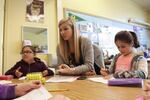
Jason does a reading exercise during class in late April. Jason and his third-grade classmates took state assessments for the first time this year.
Bradley W. Parks / OPB
The Class of 2025 is in third grade. In Oregon public schools and across the country, that means they’re taking required standardized tests for the first time.
About TheClass Of 2025
Oregon set a goal years ago to graduate 100 percent of students in the class of 2025. OPB is following a group of students from kindergarten to high school graduation to see how they do.
Jason, a third-grader at Earl Boyles Elementary School in East Portland, knew enough about the third grade tests to be nervous. He’d heard the tests lasted at least three weeks, and that the first week was a reading and writing exam.
“The second week we have to do math problems on it. And the third week, I don’t know what we’re doing on the third one," Jason said in late March, a week before starting tests. "I feel horrible. I don’t like tests.”
Thousands of students like Jason are taking required state exams that measure how Oregon schools are doing. Now that they’re in third grade, Jason and his classmates will take state exams every year through middle school.
[video: state-tests-explained-by-third-graders,right,573f69b95e0e0c00f91d2718]
Teachers know about test anxiety and try to make the exams simple.
Jason’s teacher, Michelle Moran, says it can be tough having several things to keep track of. Kids have to show they understand difficult academic content, on a computer program that can be challenging to navigate.
“If it’s a technology and an academic demand, that’s where they do get a little bit stressed out," Moran said. "Because they’ve got so many things going through their head of ‘how do I remember, what am I supposed to do here?’”
Moran taught math word problems by putting questions in a multiple choice format, like her students might see on the state test. And, she reminded students the questions can be tricky and might require them to do more than one math step.
“Is there sometimes two steps?” Moran asked the class.
“Yes,” students responded.
“Is there sometimes three steps?”
“Yes.”
“Could there even be four steps?"
Students responded again, with a loud “Yes!”
“There could be," Moran agreed. "So we’re going to look at a few of these questions together. Keep in mind, you might not be able to do just one thing to get the answer.”

Teacher Michelle Moran, center, helps students with problems during small group work in a late-March class.
Bradley W. Parks / OPB
Schools also work to get kids familiar with the computer applications they’ll use for the test.
On this morning, Earl Boyles Elementary computer teacher Lauren Huff is going over math problems with third graders.
“Question 4 has a graph, and in this graph, you’re going to have to click to fill up the lemonade cups to answer the question," Lauren Huff said directing students' attention to a large overhead projector with an image from a practice math exam.

Dude, right, works with a classmate on a writing exercise in late March. In addition to reading, writing and math, schools are trying to familiarize kids with technology.
Bradley W. Parks / OPB
Huff is making sure students understand the technology. But she emphasized some test-taking basics, too, when she checked in with students doing the practice test.
“You’re confused on question number two? Did you read through the whole question first?” Huff asked one student.
Huff might've been going over the technology on a math test, but reading and third graders are never far from the center of attention.
Earl Boyles Elementary third grade teacher Linda Long said the bottom line is this: “They need to be fluent readers to pass the test.”
Teachers and researchers agree that it's critical for students to be strong readers by the time they finish third grade — not just because of test expectations, but because teachers in higher grades increasingly expect students to access content by reading on their own.
Long and her teaching colleagues have been using the same approach to reading comprehension. The approach mirrors what the state reading test will ask.
“They read a passage and then they read a question," Long said. "They need to go back and search the passage for evidence.”
But for students taking a challenging test for the first time, that can be difficult. Earl Boyles third grader, Austin, said he would sit down day after day to take a reading exam, and have the same problem.

Earl Boyles third-grader Austin works on test prep during class in late April.
Rob Manning / OPB
“Every single time, I have to re-read this really big article, so I would remember it," said Austin with some frustration. “But every single time it takes the entire time to read it, because it’s really big.”
Students had different reactions to the tests. Remember Jason who felt “horrible” beforehand? He certainly didn’t enjoy the tests, but he thinks he did OK.
Some things about the tests frustrate teachers, too. The exams last for weeks and take hours away from class. And teachers Michelle Moran and Linda Long won’t see test results in time to adjust their teaching for these third grade students.
The scores won’t be available for months — not until the Class of 2025 is in fourth grade.
